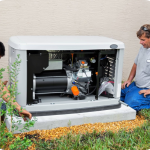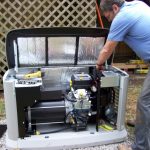Blow by engine is a prevalent problem despite the magnitude of impacts on generators’ operational performance and effectiveness. Realizing that a generator in its worst condition loses up to 25% in efficiency due to the effects of engine blow by, and an increase in generator installation cost. This occurs when combustion gases infiltrate the crankcase, resulting in low power and elevated chances of wear. Blow-by describes a situation when gases produced through the combustion process escape past the pistons and into the crankcase of the engine, and learning about it is important to guarantee your generator used during blackouts is reliable.
What is a Blow by Engine?
The blow by on engine usually happens when combustion gases from the combustion chamber find their way into the crankcase of an engine. This issue is often associated with worn piston rings or cylinder walls or with valve seats and seals that do not create an impedance when the vehicle is in operation. Blow-by is normal in all internal combustion engines, but at high levels, its effects will deter the performance of the vehicle.
Signs of Blow by Engine
Early detection of blow by in an engine is crucial to avoid increased problems like generator cranking but not starting, and others.. Common signs include:
- Excessive Oil Consumption: If oil is becoming depleted more often than expected, it may be the case that oil is being consumed through blow-by.
- Visible Smoke: White or bluish smoke type means the engine blow by.
- Reduced Power Output: If a generator is used to produce power without doing so efficiently, then blow might be an issue.
- Dirty Air Filter: Oil contamination in the air filter is another sign of blow by engine, whether diesel engines or gas engines.
Blow By On Engine: What Causes Blow By On A Diesel Engine
The answer to the question of what causes blow by on a diesel engine is a very simple but technical one. Mechanical wear or poor maintenance practice is the common cause of blow by diesel engine vehicles. Key causes include:
- Worn Piston Rings: After some time, piston rings may deteriorate and therefore let in the combustion gases.
- Damaged Cylinder Walls: Blow-by in diesel engines may also be caused by scratched or worn cylinder walls.
- Clogged Crankcase Ventilation: The blow-by is worsened by a blocked crankcase ventilation system, as it does not expel pressure.
- Poor Maintenance: Failure to have an eye on the car or take it for servicing and repairs can be blamed for the problem.
How To Fix Blow-By In A Gas Engine
When you install a home standby generator, a common question for new homeowners is how to fix blow-by in a gas engine? Addressing blow by on engine, specifically in gas engines, requires both preventive and corrective measures:
- Inspect and Replace Piston Rings: If there are worn piston rings, then they must be changed to achieve the correct sealing once again.
- Recondition Cylinder Walls: Hand lapping or re-boring cylinder walls also helps reduce scratches and leads to better honing.
- Check Crankcase Ventilation: Make sure that the Ventilation system is clean and working efficiently.
- Use High-Quality Engine Oil: Employing high-quality oil prolongs the lifespan of the engine is prolonged.
- Regular Servicing: Engaging professional generator services ensures potential issues are detected early and resolved.
On The Effect Of Blow By Engine on The Performance Of Generators
Gases can considerably alter a generator’s performance in an engine, impairing its efficiency and reliability to be impaired. Here are some of the most common impacts:
- Increased Fuel Consumption: A blow by engine uses more fuel to maintain the levels of performance that it was designed for, making operation costs high.
- Overheating: Blow-by in excess can elevate the temperatures of the engine and in the process cause even more wear and tearing.
- Decreased Lifespan: A significant reduction of the operational lifespan of generators is known to occur in cases where blow by engine is not well-checked.
- Inefficient Power Output: Blow-by may result in a generator outputting less energy than required, and issues with engine block heaters, particularly throughout their usage.
How Long Will An Engine Last With Blow-By
The question of how long will an engine last with blow-by, however, depends on the extent of the blow-by problem and the duration the engine has been subjected to this problem. Of course, rather minor blow by engine issues might simply allow the engine to continue functioning for several years, but primary blow-by might significantly decrease the engine’s lifespan. Due to the nature of the work, blow-by tends to put a lot of stress on the engine; thus, constant maintenance and early handling of any tear on the engine are essential for durability.
Blow-By Diesel Engine vs. Gas Engine
While both diesel and gas engines can experience blow-by, the causes and impacts vary slightly:
- Diesel Engines: diesel blow by engines are more susceptible to wear due to higher compression ratios. They very often involve more frequent servicing than usual in order to avoid the issue.
- Gas Engines: They have relatively low blow-by emissions but preventing wear and tear is necessary for the efficient functioning of the engines.
Preventing Blow by Engine
It is always advisable to prevent something rather than to control or treat it when it happens, as is the case with blow-by in the totality of the engines. Follow these steps to minimize the risk:
- Schedule Regular Maintenance: Regular generator services can help identify and fix early signs of blow-by.
- Use Quality Fuel and Oil: Authorized inputs mean little wear and tear in the construction process.
- Inspect Engine Components: Piston ring and cylinder wall inspections, and crankcase ventilation systems can help prevent blow by engine.
- Monitor Performance: Take note of variations in fuel consumption rate, power developed, and the level of black smoke emitted.
When to Call Professional Generator Services
In case of blow by in an engine, it is advisable to consult a specialist. Generator services can diagnose the issue accurately and recommend the most effective solutions. Whether it’s addressing a blow-by diesel engine or if you are debating over home standby generators vs battery backup systems, a generator maintenance company ensures your equipment is up to your needs and you are getting it in optimal condition.
The Role of Generators in Power Backup Solutions
There are two types of systems that are common for homeowners: home standby generators and battery backup systems. Blow by in an engine is a factor in generators, although proper maintenance can make the generators very reliable. On the other hand, Battery backup systems do not need as much maintenance as the Standby generators, but they also cannot provide much power.
Conclusion
Blow by engine is not a rare occurrence and greatly affects generator performance. The time taken to diagnose blow-by diesel engine or a gas engine, and the steps taken to rectify the problem, help homeowners increase their assets’ lifespan. Whether you’re dealing with engine blow by or seeking professional generator repair service or general generator services, regular maintenance is key to keeping your generator in top shape. At Myrtle Beach Generators, experts specialize in comprehensive generator services to ensure your equipment runs smoothly.
Frequently Asked Questions
What is the cause of a blow by engine?
Blow-by in diesel engines is attributed to worn piston rings, damaged cylinder head, and liner, and clogged crankcase venting components. These problems can however be prevented through regular maintenance.
How long will an engine last with blow-by?
Blow-by if severe, means that the lifespan of the engine is shortened. Small amounts of blow-by can be tolerated but large amounts will harm the engine and corrective actions need to be taken quickly.
How to fix blow-by in a gas engine?
Blow-by can be eliminated by having the piston rings replaced, reaming the cylinder walls, cleaning crankcase ventilation, and always using quality engine oil.
What causes blow by on a diesel engine?
Symptoms are a high rate of oil consumption, the presence of oil in the exhaust, a decrease in power output, and oily deposits on the air filter element.
How does blow by engine affect the performance of the generator?
Blow-by results in poor fuel economy, high levels of engine wear and tear, and overheating, which causes the generator to deteriorate in power output.










